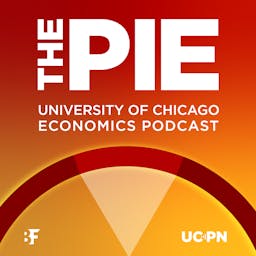

The Pie: An Economics Podcast
Becker Friedman Institute at UChicago
Economists are always talking about The Pie – how it grows and shrinks, how it’s sliced, and who gets the biggest shares. Join host Tess Vigeland as she talks with leading economists from the University of Chicago about their cutting-edge research and key events of the day. Hear how the economic pie is at the heart of issues like the aftermath of a global pandemic, jobs, energy policy, and more.
Episodes
Mentioned books

Nov 28, 2023 • 23min
Are you Trapped on Social Media?
Would you rather keep things as is, or, remove yourself and all your friends from social media? You aren’t alone if you chose the latter. Recent research from UChicago economist Leo Bursztyn ushers new survey evidence to show how fear of missing out keeps some users online. Learn more on The Pie.

Nov 14, 2023 • 30min
The New Normal: Working from Home in 2023
Roughly a quarter of all paid workdays are now done from home, up from 7% in 2019. How did this shift unfold across different areas, industries, and worker demographics? Steven Davis, Professor Emeritus at Chicago Booth and work-from-home expert, joins The Pie to share his research.

Oct 31, 2023 • 26min
The Price of Crime: What Time Behind Bars Does to Earning Potential on Release
The United States imprisons its population at a rate that is on par with North Korea. In this episode, Evan Rose of the Kenneth C. Griffin Department of Economics discusses what happens when this massive subset of individuals rejoins the labor force. Hint: It’s not what you might expect.

Oct 17, 2023 • 22min
Restorative Justice: What Happened When Chicago Public Schools Replaced Suspensions with Restitution?
The rate of school suspensions has more than doubled for Black and Latino children since 1974, inspiring a small but growing movement aimed at finding new disciplinary solutions that deter undesirable behavior without imparting harm. Harris Policy's Anjali Adukia joins The Pie to discuss her partnership with Chicago Public Schools, and what happened when teachers replaced exclusionary disciplinary practices, such as suspensions, with restorative practices that emphasize community building and restitution.

Oct 3, 2023 • 30min
A New Tactic for Police Reform: Using Behavioral Economics to Curb Unnecessary Arrests
Police use of force has prompted a national debate around misconduct and how to solve what many believe to be a systemic issue. Harris Policy’s Oeindrila Dube and Chicago Booth’s Anuj Shah partnered with the Chicago Police Department for an experiment that found a different kind of behavioral training could effectively reduce adverse outcomes.

Sep 19, 2023 • 23min
How Much Would it Cost to Save the Rainforest?
Renowned economist Lars Peter Hansen discusses the value of the Amazon rainforest as a carbon sink and its impact on climate change. They explore the challenges of incorporating uncertainty in economic models and the trade-offs of using land for agriculture versus carbon capture. The concept of putting a value on the rainforest and the importance of setting an external price for land use are also discussed. Potential solutions for rainforest preservation and the effectiveness of cost adjustments are highlighted.

Sep 5, 2023 • 27min
Lessons from Pandemic Unemployment Benefits: When Government Generosity Becomes Necessity
Economists Peter Ganong and Joe Vavra discuss the impacts of pandemic unemployment benefits on spending and job-finding. They explore the increase in benefits, challenges in delivering them, and the stabilizing effect of temporary expansions. They also discuss the need for careful policy design and implementing automatic triggers based on labor market indicators.

Aug 22, 2023 • 21min
The Hidden Economic Forces That Determine How Much You Earn
How much effect do government policies have on doctors’ wages? And when those wages are high, does it drive inequality in other jobs? And how does Taylor Swift factor in? Or Beyoncé? Joshua D. Gottlieb of the Harris School of Public Policy joins The Pie to discuss his research using detailed data to study earnings and how they’re influenced by forces like public policy and rising inequality.

Aug 8, 2023 • 23min
A Case for Public School Choice? Lessons from Los Angeles
When the Los Angeles Unified School District combined some neighborhood high schools into Zones of Choice, schools had to compete for students. The result? Achievement gaps narrowed, and more kids reported that they liked school. Chris Campos of Chicago Booth joins The Pie to discuss the results of a new study.

Jul 25, 2023 • 24min
Do You Even Crypto, Bro?
The use of cryptocurrency is on the rise, but who exactly is on the bandwagon? Chicago Booth’s Michael Weber has examined the crypto market – who’s in it, why they believe in it, and what it might mean for the future. He joins The Pie to share the surprising (and also unsurprising) findings.


